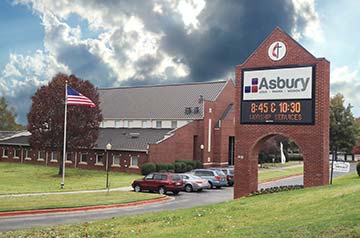 Asbury United Methodist Church (Madison, AL)
Asbury United Methodist Church (Madison, AL)
A 2013 “Good Steward” Award winner in the area of financial education / ministry, in 2009 Asbury United Methodist Church launched a church-wide focus on financial repentance that included sermons, story-telling, and educational environments. The church registered about 970 individuals — at a time when it hosted 2,000 in Sunday worship attendance — in its Momentum program, which included the Financial Peace University (FPU) ministry offering. Both programs are designed by financial guru Dave Ramsey.
Many of the spiritual adventures that started continue to this day. Besides healing marriages, lowering stress, and strengthening families, Asbury’s church family was (and is) paying off debt and creating emergency funds.
RELATED RESOURCES
- Good Steward Award Winner: First Baptist Church of Orlando
- Good Steward Award Winner: Technology (Special Needs)
- Good Steward Award Winner: Innovative Outreach
“We’ve been offering FPU for more than 12 years at Asbury and have put more than 3,000 people through the course,” explains Executive Director Jon Bridges. “Many of those who [participated] were from the community and not members or regular attenders at Asbury.”
Meg Grunke, public relations senior coordinator for The Dave Ramsey Show and The Lampo Group, says the church has done great work with stewardship. “The goal of Momentum is to put through 80 percent of the congregation,” she points out.
When you say the Momentum program was launched “church-wide,” what does that mean?
Bridges: We started in fall 2008 by putting our entire staff and most of our lay leadership through FPU. Then, in October/November that year, we advertised our stewardship promotion, which would start in January 2009, to the whole church.
We started with a sermon to introduce the entire effort, and then started in on 13 weeks of classes. Our children’s ministry developed age-appropriate classes called “Financial Fun” that went along with the topics the adults were learning each week. Every age group was engaged!
Since then, we’ve continued to offer FPU — and the new Legacy Journey program — classes year-round.
In what ways were you able to extend your reach to “blanket” the congregation?
Bridges: Getting the clergy, staff and lay leadership onboard early was key. We also used personal invitations, word-of-mouth, announcements in classes and worship services, video promotions, website announcements, and social media to get the word out.
What form did the financial repentance-focused sermons, story-telling and educational environments take?
Bridges: One of the excuses we wanted to take off the table was, “It just won’t fit into my schedule.” So, we offered FPU at 11 different time slots over six days, each week, for the 13 weeks. There was a class for everyone’s schedule. The sermons coincided with the first week and last five weeks of the classes, so we could have a great, positive finish. Every adult Sunday school class, weekday bible study and small group was encouraged to focus on financial stewardship during this period of time.
How were these offerings received by members early on?
Bridges: Very well, I’d say. Financial stewardship isn’t something we talk about at Asbury every so often; we talk about it a lot, and offer Financial Peace University — and now Legacy Journey —classes year-round. So, while the magnitude of a church-wide effort was unusual, talking about financial stewardship was not.
Did the reception change (warm up, cool down, etc.) over time?
Bridges: I think everyone warmed up to it as time went on. When a large group of people have a common topic of discussion that affects every aspect of their lives (money!), it creates a buzz.
And, the time of the year when we decided to launch this effort was no accident. January is traditionally when: 1) People make New Year’s resolutions about doing better financially, and 2) They get all their credit card bills from their Christmas spending. It’s a great time to address financial stewardship in the church.
— Reporting by RaeAnn Slaybaugh


